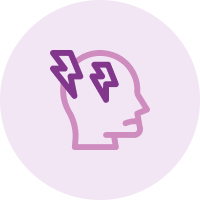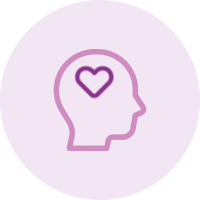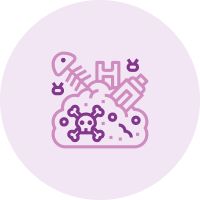Grief, loss and bereavement
Death. It sounds harsh and final, yet it is inevitable and natural.
Losing someone at any age is difficult to process and grasp.
But grief is not limited to the death of a loved one. It can occur when we lose something or someone of importance - the end of a relationship, a divorce, redundancy, retirement, or even the end of a personal aspiration.
There is no set pathway for grief, but there are signs and symptoms that typically correspond with the stages you may be in.
Emotional reactions include denial, shock, numbness, anger, appreciation, guilt, sadness, emptiness, despair, irritability, moodiness, worthlessness, anxiety and isolation. And for many, in time, gratitude and acceptance.
Physical reactions include fatigue, sleeping problems, hormonal changes, illness, changes in appetite, weight loss, weight gain and increased consumption of alcohol.
Social reactions include withdrawal from others, added pressure to take care of others in the family, conflicting feelings about seeing family and friends or worries about returning to work.
The process of grieving and bereavement varies considerably, depending on the circumstances and your cultural background.
Western cultures display death denying traits; other cultures have rituals and taboos. Social norms differ between showing emotion, how much to involve children, and whether to include or exclude ex-spouses or partners.
Grief is the natural response to loss. It might be caused by the death of a loved one, including a pet, miscarriage or stillbirth.
Divorce, or the end of a relationship.
Job loss or retirement - which can lead to a loss of identity or reliable income.
Disability from illness or a severe accident; aging, the loss of physical health and strength, or the onset of a chronic or terminal illness.
We help you move through the stages of loss and give you a safe place to express difficult feelings. We aim to support you as you adjust to a new sense of self, however long that takes.
Our counsellors and psychologists help you understand your mourning process, rather than asking you to fit into a theoretical model. They work with you to explore your feelings and personal history related to grief, addressing anxiety, depression or suicidal thoughts.
Our practitioners can help you adjust to life beyond your loss, helping identify activities and habits that nourish you, from your diet, to simply giving yourself permission to rest. They’ll support you in practising self-care and compassion, helping you reconnect with your sense of meaning, purpose and community.
Our naturopaths help address physical symptoms of grief, including sleeping problems, exhaustion, loss of appetite and hormonal changes. Herbal medicine and natural supplements can offer nourishment to your body and nervous system, reducing your stress response and supporting sleep. Homeopathy provides personalised remedies, based on your specific response to grief, to rebalance your emotions, support better mental health and encourage appetite.
Bodywork and energy medicine like osteopathy, craniosacral therapy and acupuncture can ease physical tension, anxiety, depression and sleeplessness, activating your parasympathetic nervous system, which is in charge of rest and relaxation. Somatic therapy can provide much needed comfort, giving your body a feeling of being held, and cared for.












'%3e%3cg%20id='Group_40'%20data-name='Group%2040'%20clip-path='url(%23clip-path)'%3e%3cpath%20id='Path_45'%20data-name='Path%2045'%20d='M23.55,44H20.457c-.123-.028-.245-.066-.37-.083-.736-.1-1.481-.155-2.208-.3a21.577,21.577,0,0,1-13.2-8.085,21.482,21.482,0,0,1-4.459-16.6A20.745,20.745,0,0,1,5.335,7.652,21.54,21.54,0,0,1,25.058.2,20.789,20.789,0,0,1,36.271,5.248a21.634,21.634,0,0,1,7.392,12.913c.136.757.226,1.523.337,2.284v3.1c-.094.692-.167,1.387-.287,2.074A21.768,21.768,0,0,1,36.981,38.1a21.477,21.477,0,0,1-11.108,5.555c-.77.136-1.548.229-2.323.341M9.457,21.975c0,1.776-.039,3.553.011,5.327a7.607,7.607,0,0,0,1.453,4.542,7.129,7.129,0,0,0,5.74,2.691c1.931.078,3.865.113,5.8.084a54.556,54.556,0,0,0,6.3-.278,6.248,6.248,0,0,0,5.388-4.6,11.62,11.62,0,0,0,.441-3.692c-.018-3.407-.033-6.816-.133-10.221A6.349,6.349,0,0,0,33.06,12.1a7.045,7.045,0,0,0-5.8-2.651c-3.506-.057-7.014-.04-10.521,0a7.593,7.593,0,0,0-4.267,1.231,7.01,7.01,0,0,0-3,5.967c-.064,1.773-.013,3.551-.013,5.327'%20fill='%23fff'/%3e%3cpath%20id='Path_46'%20data-name='Path%2046'%20d='M21.981,11.566c1.971.066,3.932.089,5.887.21a4.372,4.372,0,0,1,4.338,4.356c.123,3.145.12,6.3.12,9.446a14.831,14.831,0,0,1-.267,3.11A4.215,4.215,0,0,1,27.911,32.2c-3.187.111-6.379.117-9.569.119a14.288,14.288,0,0,1-3.024-.261A4.206,4.206,0,0,1,11.8,27.916c-.112-3.175-.121-6.354-.121-9.532a14.84,14.84,0,0,1,.272-3.11,4.249,4.249,0,0,1,4.12-3.495c1.969-.119,3.945-.146,5.909-.213m6.487,10.447a6.466,6.466,0,1,0-6.475,6.448,6.429,6.429,0,0,0,6.475-6.448m.287-5.26a1.508,1.508,0,1,0-1.515-1.486,1.515,1.515,0,0,0,1.515,1.486'%20fill='%23fff'/%3e%3cpath%20id='Path_47'%20data-name='Path%2047'%20d='M21.983,26.2a4.211,4.211,0,1,1,4.229-4.169A4.193,4.193,0,0,1,21.983,26.2'%20fill='%23fff'/%3e%3c/g%3e%3c/g%3e%3crect%20id='Rectangle_1422'%20data-name='Rectangle%201422'%20width='46'%20height='46'%20fill='none'/%3e%3c/svg%3e)